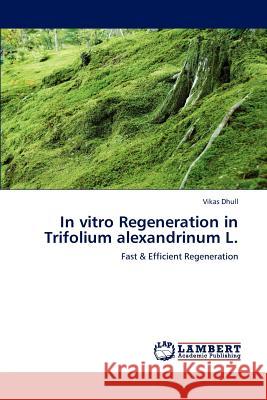In vitro Regeneration in Trifolium alexandrinum L. » książka
In vitro Regeneration in Trifolium alexandrinum L.
ISBN-13: 9783659199929 / Angielski / Miękka / 2012 / 60 str.
Trifolium alexandrinum L. (Egyptian clover) is one of the most important forage crops in the world. Its regeneration in tissue culture has been described in few reports but the efficiency, accurate time scales and the applicability to various genotypes of the described procedures are uncertain. Therefore their suitability for genetic transformation is unclear. Egyptian clover (Trifolium alexandrinum L.) is a very important annual nitrogen fixing leguminous crop. It is also an essential component of crop rotation where it must be grown at least once every 2 years to enrich the soil with nitrogen prior to cultivation of summer crops such as cotton and rice. As, it is an important leguminous crop it is very necessary to develop the fast and the efficient regeneration system. By developing the efficient regeneration system transformation can be done easily. Therefore, the present investigation was undertaken with the major objective to develop efficient protocol for in vitro regeneration of Trifolium alexandrinum L. in order to employ them for developing transgenic of Trifolium alexandrinum L.
Trifolium alexandrinum L. (Egyptian clover) is one of the most important forage crops in the world. Its regeneration in tissue culture has been described in few reports but the efficiency, accurate time scales and the applicability to various genotypes of the described procedures are uncertain. Therefore their suitability for genetic transformation is unclear. Egyptian clover (Trifolium alexandrinum L.) is a very important annual nitrogen fixing leguminous crop. It is also an essential component of crop rotation where it must be grown at least once every 2 years to enrich the soil with nitrogen prior to cultivation of summer crops such as cotton and rice. As, it is an important leguminous crop it is very necessary to develop the fast and the efficient regeneration system. By developing the efficient regeneration system transformation can be done easily. Therefore, the present investigation was undertaken with the major objective to develop efficient protocol for in vitro regeneration of Trifolium alexandrinum L. in order to employ them for developing transgenic of Trifolium alexandrinum L.











